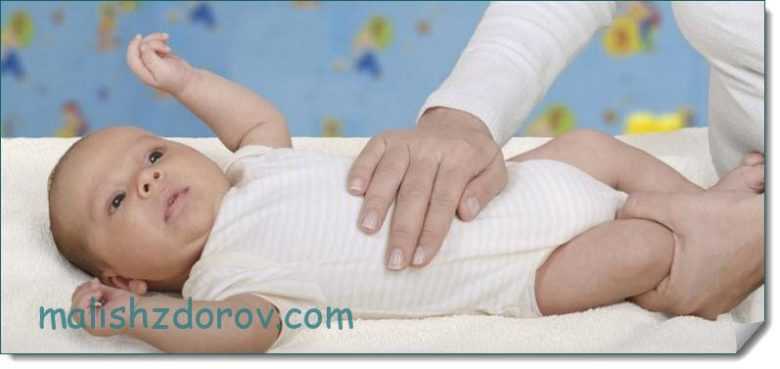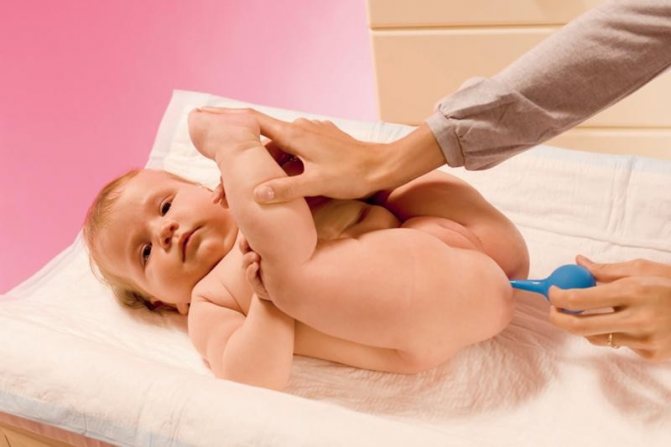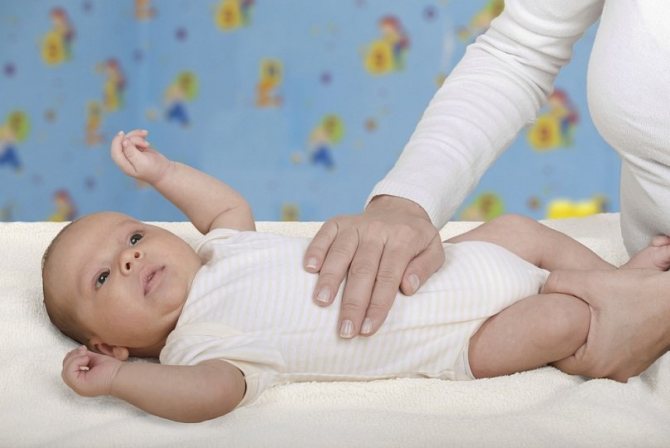Causes
The normal frequency of bowel movements in adults is once a day; many mothers transfer this standard to their newborn child, which is absolutely wrong. As a rule, an infant cleanses the intestines once every two to three days. The first stool of a newborn baby is called meconium (residual discharge of the intrauterine period, which is a mass of soft consistency, dark in color and without a strong odor), some mothers do not even see it if they are separated from the baby for the first time after birth.
A normal healthy child can go to the toilet once every 2 or even 3 days. If the newborn sleeps and eats well, then stool every 3 days is not a cause for concern.
In babies who are breastfed, the stool may be soft, sometimes even liquid, light or greenish in color with food residues (if complementary foods are introduced). The frequency of bowel movements can be any - it depends on the individual characteristics of the baby’s body and the composition of mother’s milk.
Newborns receiving artificial nutrition have bowel movements once a day or two, and stool has a denser consistency.
To date, experts have not determined clear norms for the frequency of bowel movements in an infant. The main indicator of the problem is the condition of the baby.
Constipation is the occurrence of problems with the process and frequency of bowel cleansing.
Signs of constipation in a newborn:
- poor sleep and restless behavior;
- pulling the legs towards the tummy;
- poor weight gain within a month;
- lack of appetite;
- frequent attempts to push, twisting of legs, groaning and crying with anguish;
- gas formation and bloated tummy;
- bad breath;
- prolonged delay in bowel movement caused by taking medications, especially antibiotics;
- feces are hard and pea-shaped.
Constipation symptoms
If a baby cannot poop for several days, but the listed symptoms are not observed, then these are individual characteristics of the baby’s body, and not constipation. In this case, forcing the baby to poop is not the best idea.
Constipation can occur for several reasons:
- changes in the infant's diet;
- with breastfeeding, unbalanced nutrition of the mother and lack of fluid in her diet;
- insufficient amount of food (occurs in the first days of a fragile baby’s life, when the mother’s lactation has not yet improved);
- incorrectly selected formula during artificial feeding;
- water imbalance in the baby’s body;
- lack of physical activity in the baby;
- inflammatory process in the gastrointestinal tract;
- congenital pathologies of the digestive tract;
- neuroses.
Types and causes of defecation disorders
Doctors distinguish several types of constipation in newborns. They are classified depending on the causes of their occurrence. Let's take a closer look at them.
Functional
If defecation is periodically delayed, there is no reason to worry. A violation may occur, for example, due to the fact that the baby did not receive enough fluid and overheated. Accordingly, the feces have become thicker and it is more difficult for them to move through the intestines. In addition, any type of complementary food can cause constipation, because it is difficult for the baby’s digestive tract to adapt to new food.
At an older age, the problem often develops due to emotional stress. This can be caused by any situation - new acquaintances, going on a visit, a long move, etc. Often children deliberately delay the act of defecation when trying to force them to sit on the potty.

The situation is different if the child develops regular constipation. This condition occurs under the influence of the following provoking factors:
- Features of the feeding regime. If a baby is regularly overfed, his digestive system cannot cope with the incoming food. This causes stool retention. Another reason is the wrong choice of mixture. Constipation in a baby can be caused by poor nutrition of the mother, as well as a lack of fluid in the body.
- Insufficient amount of digestive enzymes. In newborn babies, the digestive organs work in adjustment mode, that is, they are not yet functioning at full capacity. In the first months of life, the gastrointestinal tract is colonized with beneficial bacteria. With a lack of certain digestive enzymes, stool retention may occur.
- For normal bowel movements, the toddler must be sufficiently mobile. You should definitely massage him and lay him on his tummy. When swaddling is tight or clothing is too tight, the evacuation of feces from the body is often delayed.
- Taking certain medications can trigger the problem. If a mother takes certain pills, their active ingredients also reach the child.
You might be interested in: What to do if your child is constipated
In addition, constipation in infants often occurs in the presence of chronic diseases, for example, rickets, cystic fibrosis, hypothyroidism.
Physiological
Many mothers note that their babies have such a condition that the baby does not go to the toilet for 2-3 days, but feels great. The little one is active, eats well, his tummy is soft and does not hurt. Some experts argue that this condition is explained by the fact that mother’s milk is well suited to the baby and is absorbed one hundred percent.

If a newborn has any negative symptoms, for example, abdominal pain, restlessness, crying and groaning during bowel movements, this is no longer considered physiological constipation. In such a situation, parents should definitely consult a pediatrician.
If there is no bowel movement for several days and the baby is feeling well, this condition is considered normal and in medical practice is called physiological constipation.
Organic
Organic stool retention is considered the most dangerous. This disorder can occur in children of different ages (4, 5, 6, 7, 8 months and older). The inability to go to the toilet is largely explained by the presence of problems such as adhesions in the intestines, cancerous formations in the digestive organs, lengthening of intestinal sections and others.

As a rule, such pathologies are detected in utero or in the maternity hospital. Treatment is carried out through surgery.
How to help your baby poop
How to help a child with constipation quickly
If a situation arises that a newborn cannot walk for a long time, what should you do? Identifying and eliminating the causes of the illness solve the problem gradually, the baby asks for help and does not stop crying. In such cases, pediatricians recommend:
- Get a massage. Ten gentle circular movements clockwise in the navel area help the baby achieve results.
- Use of laxatives. Glycerin suppositories and oral laxatives are good for constipation.
Note! Manufacturers recommend glycerin suppositories for use by children from 3 months of age. For newborn babies, suppositories with a child's dosage are divided into 2-3 parts and, before inserting into the anus, a round stick is formed from the cut-off part with your fingers.

Glycerin suppositories
- Using an enema.
- Traditional medicine products.
Important ! Before using traditional medicine, be sure to consult a doctor to avoid allergic reactions.
The use of traditional medicine has a number of specific advantages:
- decoctions and infusions are based on natural medicinal plants without chemical elements;
- the ingredients of home remedies are harmless to the baby;
- quickly have a laxative effect;
- help eliminate colic and reduce flatulence;
- activate intestinal motility and peristalsis;
- stimulate the emergence of natural urges to defecate;
- available for manufacture and use at home.
Despite the obvious advantages, the use of home remedies requires compliance with certain requirements:
- Preparations with senna, rhubarb root and buckthorn bark are prohibited for children under 1 year of age.
- When making decoctions for babies, do not use several components at the same time.
- Therapy begins with a minimum dose of the drug, after which the body’s reaction is monitored.
- Treatment continues until the gastrointestinal tract is restored.
Use of traditional medicine methods
If a child cannot poop for several days, then one of the effective traditional medicines is sunflower oil. It helps soften stool and smooth bowel movements.
Application – 15 drops of sunflower oil are mixed in a spoon with a small amount of breast milk or infant formula and given to the newborn an hour before meals. From six months onwards, they prepare and give the child a mixture of butter and kefir in the evenings, and in the morning they get the desired result.
Important! “Grandmother’s” advice for treating constipation in children using a bar of soap inserted into the anus is not recommended by pediatricians for use.
Herbal treatment for constipation
Flax seeds contain minerals and dietary fiber that help gently cleanse a child's intestines of feces.
Methods of treatment with flax seeds:
- pour 60 g of boiling water into 1 teaspoon of ground flaxseed, stir and leave for a quarter of an hour in a sealed container. ½ teaspoon of infusion is mixed with water or milk and given to the newborn 3 times a day;
- 50 g of crushed flaxseed is poured into 250 g of hot water and left in a thermos for 8 to 10 hours. Use a tablespoon several times a day.
The famous dill water, which relieves gastrointestinal spasms and relaxes the smooth muscles of the intestines, is prepared from fennel seeds. Traditional medicine recommends the use of this drug from the moment of birth not only for the treatment of constipation, but also for the prevention of disorders of the digestive tract.

Dill water
Preparation of dill water
Pour a tablespoon of fennel seeds into a glass of boiling water and leave for 1.5 hours. The infusion is filtered and given to the baby a teaspoon 15 minutes before meals. With breastfeeding, mother for 5 minutes. holds dill water under the tongue for 30 minutes. before feeding.
Traditional medicine recommends the use of laxatives for children in the first year of life:
- Fennel seeds - 3 g, licorice root - 10 g, ground flax seed - 15 g. Pour a glass of boiling water over the ingredients and simmer in a water bath for 10-15 minutes. 2 tablespoons of decoction are given to the baby before bedtime.
- Pharmaceutical chamomile - 40 g, dill seeds - 10 g, dandelion root - 5 g. Prepare a decoction according to the previous scheme and give the baby 2 tablespoons 2 times a day.
- Chamomile – 2 tablespoons, oregano herb – 1 tablespoon. The mixture is poured with a glass of boiling water and left for 8 hours. Filter and take 1-2 tablespoons 2 times a day.
Fermented milk products are also effective if your newborn is unable to poop. Fresh (daily) kefir removes toxins from the intestines, normalizes the activity of the gastrointestinal tract, is a natural prevention of dysbacteriosis, and has laxative properties. Children are given a drink warmed to room temperature. To increase the laxative effect, kefir is mixed with sunflower or olive oil.
In order for the baby to go to the toilet as much as possible, parents give him plums, which have good laxative properties, fresh berry puree is introduced as complementary food no earlier than at 8 months. Until this time, the baby is given a decoction or infusion of prunes. From 6 months you can give compote of prunes, dried apricots, raisins and dried apples.

Baby can't poop
When is an enema needed?
This is a radical measure. They are used extremely rarely so as not to cause addiction and disruption of the digestive tract. An enema is done when:
- food poisoning;
- the need to use rectal medications;
- prolonged constipation.
Important! Pediatricians prohibit doing enemas for preventive purposes, since the procedure washes out the intestinal microflora, which is still developing in the baby.
Young children are given 4 types of enemas:
- Cleansing (cleanses the intestines during constipation or before certain procedures). For this procedure, boiled water with a temperature below 360 is used.
- Medicinal (used to administer medications). Carry out after a cleansing enema, use boiled water 370.
- Siphon (used for the treatment of severe poisoning and only in medical institutions).
- Oil (used for childhood constipation).
If necessary, cleansing and oil enemas are given to the baby at home. To do this, prepare in advance:
- syringe (infants under 1 month of age use a syringe with an elastic spout No. 1),
- boiled water cooled to 28-300 or boiled vegetable oil cooled to 370,
- cream or Vaseline,
- oilcloth, cotton pad.
How to give an enema:
- Boil the syringe for 30 minutes.
- Wash your hands thoroughly with soap.
- Prepare water, medicinal solution or oil for the enema, check its temperature with a thermometer.
- Remove the boiling water from the syringe and take the prepared solution or oil (for a newborn, the volume of liquid is 20-30 ml, for a grown-up toddler - up to 40-50 ml).
- Lubricate the syringe tube with Vaseline or cream.
- Place the child on an oilcloth on the back or on the left side with the legs pressed to the tummy.
- Calm or distract the baby with a toy.
- Lubricate the anus with Vaseline or cream.
- With your right hand, vertically squeeze the air out of the syringe.
- With your left hand, spread the buttocks, carefully insert the nozzle of the syringe into the anus approximately 2 cm.
- Slowly inject the liquid and, without unclenching the syringe, take it out and apply a cotton pad to the anus.
- Squeeze the child's buttocks.

Enema
The baby will be able to pump himself in 30-40 seconds.
How to help your baby at home?
Help for a child at home should be provided only if the problem is irregular and occurs sporadically. Let's look at methods that parents can use to make bowel movements easier for their newborns.
Daily massage and gymnastics
To improve the motility of the stomach and intestines, it is recommended to massage daily. It is best to perform this procedure after taking a warm bath. After lightly massaging the baby's tummy in a clockwise circular motion, begin performing gymnastics.

In this case, the toddler’s legs, bent at the knees, should be brought as close to the tummy as possible and straightened. The exercise is repeated 5-7 times. After this, you can lay the little one on his tummy. The purpose of such gymnastics is to normalize peristalsis.
Expert opinion
Ksenia Dunaeva
User experience expert and comment moderator. Higher medical education and more than 5 years of actual practice.
Ask Ksenia
If during the procedure the child shows anxiety, is capricious and bends over, you should not continue the gymnastics. To conduct a session, the newborn must be in a good mood, otherwise the baby can be seriously harmed.
Use of medications
First aid for constipation may well be provided with the help of certain medications. Whatever products you use, you should first consult your doctor.

Parents should have the following medications in their home medicine cabinet:
- Glycerin suppositories. Glycerol, which is the main active ingredient in such drugs, is considered relatively safe for infants. Such suppositories can be used if you have a one-month-old baby, a three-month-old toddler, or an older baby. When the problem develops, a suppository is inserted into the rectum and a bowel movement is observed after a few minutes. At the same time, Glycerol is absolutely not absorbed into the blood. The substance is excreted unchanged in the stool.
- Microclyster Microlax. This is another safe and effective drug for constipation in children and adults. The product is easy to use, does not cause discomfort to the baby, the effect of its use occurs within 5-10 minutes.
- Duphalac, Normolakt, Normaze and other lactulose-based medications. Their action is considered the safest for the digestive tract of newborn babies, therefore these drugs are most often used among infants.
You may be interested in: Colic in a newborn during breastfeeding
Each medication has its own indications, contraindications and side effects. Medicines should be used very carefully and only as prescribed by a doctor. This will help prevent various complications and achieve maximum therapeutic effect.

You might be interested in reading about mommy’s nutrition during the first month of lactation. All the necessary information is here.
Application of a gas outlet tube
To facilitate the act of bowel movement and combat colic at home, it is recommended to use a gas outlet tube. You can buy it at any pharmacy. Operating instructions for the device:
- Wash your hands thoroughly with warm water and soap.
- Lubricate the tip of the tube well with Vaseline or boiled vegetable oil.
- The baby should be placed on his back, with his knees bent and brought to his chest.
- Slowly and as carefully as possible, insert the tube 2 cm.
- Typically, the session time is about 10-15 minutes.
- To make sure that the gases are leaving, you can lower the other end of the tube into water.
- As soon as the baby starts pooping, the tube is removed.
It is contraindicated to use this device for intestinal bleeding, if the baby has tumors in the gastrointestinal tract, with the development of an inflammatory process in the rectal area, as well as with intestinal obstruction.
The relationship between mother's diet and baby's stool
A newborn has a tummy ache - how to help
If the baby is breastfed, then the mother’s diet greatly affects the functioning of the baby’s digestive system. Problems with the toilet can be caused by the use of:
- flour and pasta products (especially fresh bread and baked goods);
- rice in any dish;
- mushrooms;
- canned foods;
- strong tea and coffee;
- fatty rich broths;
- whole milk.
Breastfeeding mothers, who are careful not to eat foods that cause negative consequences for the newborn, rarely have the question of how to help their baby poop. To prevent problems with cleansing the baby’s intestines from becoming systematic, the mother should include beets in her diet in any form, preferably boiled. Beetroot salad for a nursing mother is not seasoned with mayonnaise, but only with vegetable oil. Oatmeal or buckwheat porridge in the morning will be useful not only for the mother, but also for the baby. Introducing plums, raisins, dried apricots, prunes, fermented milk products into the mother's diet or drinking a small amount of pear or plum juice will also have a good effect on the frequency of bowel movements of the baby. To improve the baby’s intestinal motility, the mother needs to drink at least 2 liters of water per day.

Problems with bowel cleansing in a child
New foods are introduced into the nursing mother's menu in small portions, and then the baby's reaction is monitored. Each baby reacts individually to changes in the mother's diet.
To improve the baby's stool and prevent constipation, the mother usually follows a laxative diet, but within reason - frequent consumption of laxative foods will lead to diarrhea.
Features of the treatment of constipation in older children
Abnormal bowel movements often develop not only in newborns, but also in older children, for example, at three or four years old. In this case, the act of defecation can be observed once every three days.

It would be wrong to solve the problem with a massage and an enema. It is important to normalize peristalsis through proper nutrition and sufficient physical activity. It is recommended to consult a pediatrician first.
Nutrition for constipation
If there is a problem with stool, you should clearly select food for the baby. It is known that some foods strengthen the stool, while others, on the contrary, weaken it. In the table you will find recommended and undesirable foods for constipation.
| Can | It is forbidden |
| Savory pastries, biscuits, crackers, rye bread. | Sweet pastries, muffins, cakes, pastries, chocolate, fresh white bread. |
| Vegetable soups cooked in weak meat or fish broth, cabbage soup, beetroot soup. | Rich meat and fish broths with fatty fish and meats. |
| Buckwheat, oatmeal, wheat porridge with water or milk. | Rice, semolina porridge. |
| Lean meats - chicken, turkey, rabbit. | Fatty meat - pork, beef, lamb. |
| Boiled or baked fish of dietary varieties. | Fatty fish. |
| Boiled, fresh and baked vegetables and fruits. | Quince, dogwood, mushrooms. |
| Vegetable oils. | Animal fats, butter, margarine. |
| Fermented milk products with low fat content. | Fatty dairy and fermented milk products - sour cream, cottage cheese, cheese. |
| Green herbal teas, compotes, purified water. | Strong tea, cocoa. Sweet carbonated drinks. |
You might be interested in: Red, pink or white spots on your baby's tongue
Food should be prepared by boiling, stewing or baking. The child should take food in small portions 5-6 times a day. If you can’t choose a diet on your own, you can seek help from a nutritionist. The doctor will help you create a daily diet for your child in accordance with his individual characteristics.
Exercise stress
For the digestive system to function well, it is important to maintain sufficient physical activity. Children, as a rule, do not sit still for a long time. If your child does not like active games, try to interest him. Show them that playing catch or jumping rope is fun.

Spend more time with your baby, walk outdoors more often. This will help solve the problem and establish trusting relationships with adults.
Can I use an enema?
It is recommended to use an enema only as a last resort if other treatment methods are ineffective. You should not get carried away with this procedure, as it disrupts the intestinal microflora. In addition, the procedure brings discomfort to the child, and he is often afraid of it. The enema is performed as follows:
- The tip of the syringe must be sterilely clean. Before inserting it into the rectum, you should generously lubricate it with Vaseline or baby cream.
- The baby should lie on his side, knees bent towards his stomach.
- After inserting the tip, slowly inject the liquid. In this case, you should not make sudden movements.
For an enema, use a weak chamomile decoction or boiled water. The liquid temperature should be 23-24 degrees. For a baby up to a month, take 30 ml of water, after three months - 60 ml, from six months - 90 ml. For children 5-7 years old, 150 ml of liquid can be administered.

Let us remind you that too frequent use of this method of relieving constipation can greatly disrupt peristalsis.
Preventive actions
Constipation in a child from formula - how to help at home
A baby on breastfeeding may have stool once every 3-4 days. Modern pediatricians consider this normal if the baby’s condition is satisfactory. Breastfed babies rarely experience constipation if the mother eats properly. Most often, their constipation is treated by changing maternal nutrition.
Children who are artificially born have problems with the toilet more often. Dr. Komarovsky believes that this is due to a lack of water in the baby’s body. To compensate for the lack of fluid, the child is given plain water with the addition of a few drops of dill seed decoction. Milk formulas for the baby are diluted exactly according to the instructions (the habit of some mothers to make the mixture more concentrated will not benefit the baby). Mixtures are selected with the presence of lactobacilli.
To prevent constipation, the baby is often placed on his tummy (for 5 minutes before feeding), a tummy massage and gymnastics are performed: the legs are bent and unbent at the knees, and raised up. Exercises on a fitball are also a means of preventing constipation.

Preventive gymnastics
after the enema the child did not go to the toilet
I didn't like being pregnant. In the first months I constantly wanted to sleep and vomit, and in the last months I had such a huge belly that my husband had to wheel me around the apartment in a wheelchair. One day, when he was not at home, I wanted to eat apples, and I went to the refrigerator. Opening the door, I crouched down to get to the bottom shelf where the apples were stored. I took the apple, but I couldn’t get to my feet in the starting position, so I inserted the unwashed apple into my mouth in one piece and crawled on all fours to the sofa so that I could push off from it and stand up. The cats shied away from me in horror. I was constantly in a dull mood. And my stomach was itching terribly, and in general, the 30 kg of weight I gained did not leave anyone indifferent. My friends looked at me and said damn. It looked especially funny also because I had not gained any weight, and my stomach simply moved forward, like it was a loggia. It was very difficult to sit at the table; all the food went past my mouth and fell onto my stomach. Sleeping was also very unpleasant. You can’t lie on your back, nor can you lie on your side. At night I got up to go to the toilet every 40 minutes. Therefore, the dream was not a dream, but a stupid struggle with the stomach. Sometimes I cried and dreamed that I would give birth and get some sleep. Fuck there. But more on that later. It still pisses me off when they say pregnancy is a happy time. Get some sleep, sort of. Only women who are not themselves are happy at this time. But an ordinary person will never be pleased to be in a state of discomfort and at the same time have an unattractive appearance (and there is no need to say that pregnant women are beautiful - this is a blatant lie, invented in order to support the unfortunate belly women who for some reason love pregnant photo shoots so much) . I have been afraid of childbirth since childhood. After reading the pregnancy community, I realized that the key feature in childbirth is an enema. I was afraid of her. Since I had a planned cesarean section at 38 weeks, I was also very afraid of giving birth prematurely. The last 2 weeks before giving birth, I woke up my husband twice, and we ran to the maternity hospital in the oncoming lane, as if I was giving birth. It’s strange, but no one scolded me for false contractions. Only after the second time my husband stopped believing me, so when on October 15th I got up and said that I would give birth today, he just waved his hand and said - well, yes, well, yes. And we went for a routine examination to the gynecologist. I took the charger with me just in case. During the examination they told me. Oh, you’re already very dilated, can’t you feel the contractions? I said that I have been feeling contractions for the last 8 months. But no one believes me, so no - consider that I don’t feel it. They asked me if I had eaten anything in the morning, and I said that I had a little snack before the doctor’s visit - 2 boiled eggs, a glass of milk, 4 cheese sandwiches, half a glass of nuts, dried apricots and 2 tomatoes. And tea. And it's time for spoons of condensed milk. They told me, go to the 3rd floor, your room is there, the birth is at 16.00. I asked when is the enema? And they looked at me worriedly. I immediately liked the room because it was large and the bed was already made for my husband. In the room they put me on a drip, told me not to have any more snacks or drink water, and they sent an aunt who dressed me in funny government clothes with teddy bears. I waited patiently for the enema. And I started telling everyone I knew via mobile phone that I was giving birth today. Oh, I wish I hadn’t done this, but who knew. Somewhere around 15.00 they brought me a paper to sign, which said that if I died in childbirth, then it was my own fault. I happily signed it and asked when the enema was due. Five minutes later the nurse came and said that they told me that you wanted an enema. I told her that I didn’t want an enema, but since they were going to do it, I wanted to prepare. She said that we usually don’t do enemas before childbirth, but if you insist, then let’s do it for you. I said - well, no, no. And I was happy. This was the first thing I was happy about during my entire pregnancy. A minute later I was taken to the operating room. And the husband was sent to another room to change into a surgeon’s suit. In the operating room they gave me an epidural injection in my back, and I could no longer feel my legs. I hadn’t been able to see my feet for three months already because of my huge belly, but here I couldn’t see or hear them. A very interesting feeling. It seems that your legs are two huge swollen pillars that are not yours and that lie separately from your body, and even in a strange position - 2nd position in ballet. Masked people crowded into the room, and at some point one of them leaned over and kissed me. Five minutes passed before I realized it was my husband. So I thought that this was a service in the maternity hospital - a kiss from a stranger. The husband was also good, he ran around the operating room and clicked the camera in every corner, while making people in masks smile. What I didn’t expect was a huge number of people in the room, but then they explained to me that for each child there is a pediatrician and 2 nurses, so that’s why. A moment later, a screen was pulled in front of my eyes. My doctor came and asked how I was feeling. I said it was awesome. Lying in a room full of people, in pajamas with teddy bears in the second position, with a bare stomach and who knows what else - my deepest dream. The doctor asked for music, but got a bang, and they started cutting me. I didn't feel anything, and it bothered me. And the doctor was worried that my husband was clicking everything he saw. As a result, he was asked to sit at his wife’s head and sit there until the end. Five minutes later my first baby was pulled out of me and he said ahhhhhhh. They told me it was good and took him away to dry him. A minute later they pulled out a second one who said exactly the same words. They also took him to wash and after another 3 minutes they gave me both of them in funny hats. I looked at them and thought - oh, that’s what was itching in my stomach. And I felt absolutely nothing. The four of us were photographed by a nurse, the children were taken upstairs, I was pleased that both children had an apgar of 10/10, and this is rare for twins. And then they took me back, and everyone began to applaud, as if we had just landed together on a plane with one engine, which was flown by a drunk stewardess. I didn’t understand why, but I did too, and my husband hit me on the hands - don’t clap, he said, they’re clapping for you, behave more modestly. I was briefly taken to the intensive care unit, where a tube with hot air was inserted under my sheet. For heating. About five minutes later I was already being taken to the ward, where all the relatives were standing on their ears, surrounding the crib with two baby dolls. The baby dolls were examined by a pediatrician. And they sort of forgot about me. Then they remembered me and started applauding again. This applause infuriated me terribly, because I was not dressed according to the regulations and could not feel my legs. I was also stressed by the fact that I had a catheter and a bag of urine. Then people started coming. Anyone who was at my wedding remembers how many people were there. Here they come. There are no visiting hours in the maternity hospital, you can come in whenever you want. If you knew how sick the visitors were to me during the 2 days that I lay there. I had a cord in my hands with a button that I had to press when my seam hurt. I pressed this button every 15 minutes, but then they told me that it was a placebo, that is, a deception; anyway, the painkiller was not delivered more than once an hour. And I didn’t like that either. At night, every 2.5 hours they brought the children to me for feeding. When I heard that a cart with children was driving along the corridor, I pretended that I was dead, but the nurse did not like it, she persistently but politely woke me up with the words - your children want to eat. I kept wanting to shout to her - well, feed them, it hurts me to feed them! But I didn’t do this because I didn’t want people to think badly of me. And yes, feeding was very painful for me. I admit that for some it doesn’t hurt, but everyone I know had it, at least for the first couple of months. And I also had a constant feeling of tiredness, because I had no time to sleep. Two hours of restless sleep a day was not enough for me. Then we were discharged and something that is not written in books began. I'll tell you later if anyone is interested. After the maternity hospital. Continuation. I was discharged from the maternity hospital on the 2nd day. If I had known what kind of meanness awaited me at home, I would have broken my arm and leg and, possibly, my nose in order to lie in the maternity hospital longer. I liked everything in the maternity hospital, from the food to the fact that they carefully washed me with a mop, like I was a Mercedes. Waiting for me at home were hungry fish in the aquarium, moderately well-fed cats, an unharvested harvest of watermelons in a farming game, and 2 screaming bags that I brought with me from the maternity hospital. Probably the longest sleep my husband and I had was on the first night at home, because we set up the baby monitor, put the kids to sleep in their cribs in their room, and went to bed in our bedroom. Well, we didn’t know that the baby monitor’s batteries would run out and we slept for 3 hours, waking up to hellish screams from the nursery. After that night, my husband and I moved into the nursery. The children woke up, I fed one while my husband changed the diaper of the second, then we swapped children, I fed the second, then again the first, because it seemed to us that he was underfed. At this time, the second one fell asleep, but woke up exactly when the first one finished eating, and I had to feed him again. For the first 3 months it seemed to me that this mutual responsibility would never end. At the same time, we kept a journal where we wrote down by time who slept, ate, peed and pooped. We started keeping a journal after we mixed up the kids and fed the same one twice and left the other one hungry. After this incident, we painted one child’s toenail, but then we actually forgot whose one we painted. Then we stuck patches with their names on their chests. I guess I was lucky because my husband helped me a lot and is still helping me. I don’t understand how you can cope with a child at home alone. Even if it's not twins, but one child. For the first 4 months, my mother-in-law helped us - she prepared food, because I didn’t even have time to go to the toilet. Going to the shower was a holiday for me. And this despite the fact that we hired a daytime nanny when the children were one and a half months old. Even if I went to the store for a second, I was afraid that I would be hit by a truck, that the hospital would not be able to find my Rh-negative blood, and that my children would be left without food. Because I felt like food. And I felt sorry for myself, and I cried a lot. Around the 5th month, my husband decided to show me to a specialist and I was diagnosed with postpartum depression. I liked the diagnosis, and I really wanted to hide behind it, stop breastfeeding my children and switch to artificial feeding, but reading the damn community “lyalechka” convinced me that I was selfish and that I needed to continue feeding. To tell the truth, every month it became easier and easier for me, because you get used to lack of sleep. When the children were 5 months old, I went to work. I continued to feed them at night and in the morning, and at work I pumped and brought milk in the evening so that the nanny would follow up. I fed it to them for a day. I don’t know why, but I had a lot of milk, I’m not afraid of this word. This continued until 7.5 months. Then they themselves stopped eating at night, probably because we started giving them porridge in the evening. And I gradually stopped breastfeeding. I thought that was it, I would finally sleep now. Fig. Their teeth began to grow. And at night they slept, waking up to scream every hour and never at the same time. We had to go into the room, pick him up, rock him, calm him down and put him down again. And so on 24 times per night (12 per person on average). We tried sleeping together, but it didn’t work out for us because I was a light sleeper and it always seemed to me that one of the children fell on the floor. One night my husband found me crawling on all fours on the floor looking for the children, although they were sleeping peacefully in their cribs. Now my children are almost 2 years old. They still don't sleep well because not all their teeth have come out yet, but we've gotten used to it. We have our own system (one child per person), thanks to which we began to dress better (crossed out) and sleep. What good can I say. Children are wonderful. Nothing can compare to the feeling when your child in the park runs towards you screaming daddy (and you are mom) with something clutched in his little fist. He unclenches his fist, and in it is dry dog poop. And he smiles with his gap-toothed mouth, and he's proud that he brought you the poop. And yes, this is happiness.
When to see a doctor
Parents do not always cope with constipation in children on their own. If constipation is accompanied by severe bloating and pain in the abdomen, bowel movements are rare and abundant and look like dense pellets, then consultation with a specialist is necessary.
Important! In case of bloody or brown discharge, the child is immediately shown to the doctor.
Parents also consult with a pediatrician before using laxative medications or using glycerin suppositories.










